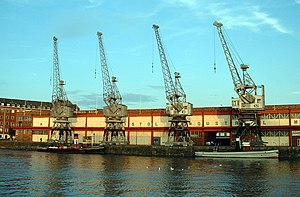 Image via Wikipedia
Image via Wikipedia
I have some concerns about the new West of England Partnership, which will come into being next year, replacing the Regional Development Agency, which has been axed. Here's an initial observation and question. More questions in the future, perhaps::
Why is the Partnership's 2026 vision statement so focused on supporting the employer-employee model of job creation? Consider its opening statement, which describes the greater Bristol area in 16 years' time as:
Apparently, the author(s) believe that by (a) improving roads, trains and the airport, and by (b) "major improvements" in employment, the social and economic gap between rich and poor in Bristol will reduce.
That is an astonishing claim. It rests on an employer-centered model of economic development, seeing the presence of companies that pay wages to employees (along with good transport systems) as a major contributor to economic equality.
History, however, tells a rather different story. In a globalised economy, four things things tend to happen to successful companies.
Why is the Partnership's 2026 vision statement so focused on supporting the employer-employee model of job creation? Consider its opening statement, which describes the greater Bristol area in 16 years' time as:
"One of Europe’s fastest growing and most prosperous sub regions which has
closed the gap between disadvantaged and other communities – driven by
major developments in employment and government backed infrastructure
improvements in South Bristol and North Somerset."
Apparently, the author(s) believe that by (a) improving roads, trains and the airport, and by (b) "major improvements" in employment, the social and economic gap between rich and poor in Bristol will reduce.
That is an astonishing claim. It rests on an employer-centered model of economic development, seeing the presence of companies that pay wages to employees (along with good transport systems) as a major contributor to economic equality.
History, however, tells a rather different story. In a globalised economy, four things things tend to happen to successful companies.
- Firstly, they are floated on the stock market, becoming essentially focused on generating profits for share holders, however that can be legally achieved;
- Secondly, the wage levels between the senior managers and the lowest-paid workers tend to increase;
- Thirdly, they tend to get taken over by larger competitors;
- Fourthly, they tend to outsource their production to countries with cheaper labour markets
This is exactly what happened, of course, to the Cadbury's chocolate factory at Keynsham, where as I write, the last of the 500 workers to lose their jobs will be facing unemployment as production is moved by new American owners Kraft to Poland and elsewhere.
This job-cutting announcement, it should not be forgotten, was made one week after the takeover by Kraft and following assurances that the factory would be kept open.
Clearly, the interests of global firms, who increasingly operate alongside or beyond the effective control of national governments (witness the large number of "British" companies that are registered in Switzerland, to avoid business tax in the UK) are not the same as the interests of individual workers from Bristol whose livelihoods can be taken away at a moment by executive boards meeting in New York, Shanghai or Dubai.
It's worth noting as well that the improved transport infrastructure that the West of England Partnership advocates is, indeed, a core element in successful business - though not in the way that I suspect the Partners envisage. Kevin Carson argues (convincingly, in my view) that the costs of major transport and communication infrastructure that facilitated the creation of a national market for goods in the nineteenth century were paid for by taxpayers but disproportionately benefited corporations. Although I haven't seen any raw data for the C21, I assume that similar forces are at work in the formation of global markets.
Of course, the gap between rich and poor certainly needs closing - it has widened significantly in Britain over the last thirty years. There is an alternative way of working towards this aim, however, which does not place us at the mercy of global corporations. The Distributist economic model argues for a settlement in which the vast majority of individuals own their own means of production, either as self-employed small businesses, or as members of worker-owned cooperatives. As one report noted on the subject:
"Employee-owned firms have outperformed the FTSE-All Share Index over the last 18 years by an average of 10%.
When shares are distributed to all employees we see a minimum 5%c productivity gain and often more, according to research."
There's no inherent reason why such an economic model could or should not be implemented at the heart of sustainable development of the Bristol region. All that needs to happen is for the rules to change. I've written previously about Distributism here.
If you enjoyed this post, get free updates by email or RSS.

No comments:
Post a Comment